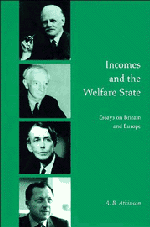Book contents
- Frontmatter
- Contents
- List of figures
- List of tables
- Preface
- Introduction
- I Income inequality and poverty in Britain and Europe
- 1 What is happening to the distribution of income in the UK?
- 2 Income distribution in European countries
- 3 Poverty, statistics and progress in Europe
- 4 Comparing poverty rates internationally: recent studies in OECD countries
- 5 Two nations in early retirement? The case of Britain
- II Analysis of the Welfare State
- III Targeting and the future of social security policy
- Notes
- Bibliography
- Name index
- Subject index
1 - What is happening to the distribution of income in the UK?
Published online by Cambridge University Press: 03 May 2011
- Frontmatter
- Contents
- List of figures
- List of tables
- Preface
- Introduction
- I Income inequality and poverty in Britain and Europe
- 1 What is happening to the distribution of income in the UK?
- 2 Income distribution in European countries
- 3 Poverty, statistics and progress in Europe
- 4 Comparing poverty rates internationally: recent studies in OECD countries
- 5 Two nations in early retirement? The case of Britain
- II Analysis of the Welfare State
- III Targeting and the future of social security policy
- Notes
- Bibliography
- Name index
- Subject index
Summary
The question examined in this chapter has been out of fashion in recent years. In this respect, there is a marked contrast with the situation 20 years ago. At that time, there was considerable discussion about the distribution of income and about the distributional consequences of government policy. In the 1960s, there had been the rediscovery of poverty in Britain and the launching of the War on Poverty in the United States. New measures for income maintenance were being planned and issues of fairness were much debated with regard to incomes policies.
Along with public interest came scientific research. In the United States, the War on Poverty was accompanied by large-scale research projects, including the negative income tax experiments, and by the founding of the Wisconsin Poverty Research Institute. In Britain, there was a considerable improvement in the availability of official statistics, including the fuller exploitation of existing household surveys such as the Family Expenditure Survey and administrative sources such as the estate duty returns. In the second half of the 1970s, the Royal Commission on the Distribution of Income and Wealth was established.
The position today is different. For the last 10 years there has been little public concern in Britain about the distribution of income, and it does not appear to be high on the political agenda. Yet this is a period which one suspects has seen major changes in the distribution of income.
- Type
- Chapter
- Information
- Incomes and the Welfare StateEssays on Britain and Europe, pp. 15 - 40Publisher: Cambridge University PressPrint publication year: 1996
- 3
- Cited by



